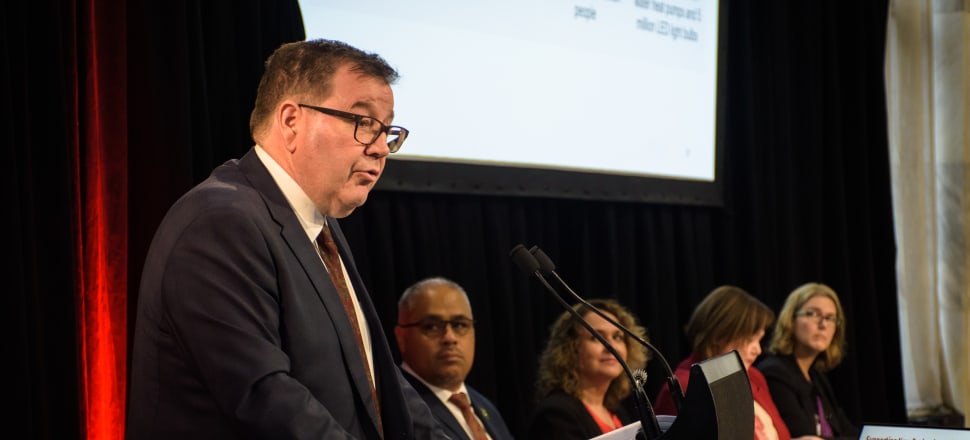
The cornerstone of the Government’s cost-of-living package won’t kick in for almost a year. It isn’t the big ideas Budget Grant Robertson would have liked to deliver and leaves it exposed to attacks from the Opposition in election year.
Comment: The extension of the 20-hours free early childhood education for two-year-olds, designed to ease immediate cost pressures on households, won’t come into effect until March.
It’s the big-ticket item in the inevitable cost of living package but won’t give parents the estimated $130 a week of savings when the pressure is being felt most – right now.
Though early childhood operators need time to prepare for any increased demand that will come because of this announcement, it does raise questions about whether something non-inflationary that could be implemented faster would have been a better idea.
Finance Minister Grant Robertson blamed the delay on an administrative issue.
The more immediate assistance to households is the universal offering in this year’s Budget, the scrapping of the $5 prescription charge for medicines, which comes into effect from July.
There were more than 135,000 adults who didn’t collect their prescriptions between 2021 and 2022 because of cost, and it was low-income families, Māori, Pasifika, and disabled communities that felt the brunt of that.
Robertson described this Budget as one that is “appropriate for the time we’re in” and though it doesn’t give a lot to the masses, he said most New Zealanders want inflation to come down and that’s what his sixth Budget is expected to do.
READ MORE: * ECE expansion, prescription changes in 'pragmatic' Budget * Budget 2023: No ‘major’ new taxes but $80b more tax revenue * Budget 2023: Climate fund slashed by $800m
Realistically, extending free childcare and scrapping prescription charges could have been announced by a National-led government, and the Opposition will struggle to argue it’s not good policy.
It’s the lack of any real investment in the law and order area, and movements around tax, that will be the focus of National’s attentions.
In election year, Christopher Luxon and Nicola Willis are laser-focused on convincing voters that Labour is out to take more of your money.
Though major tax changes, in particular a wealth or capital gains tax, were ruled out ahead of this Budget they remain on the table for Labour’s manifesto heading into the October election.
The Budget has made a minor change around the way trustees are taxed, raising that tax rate in line with the top bracket of 39 percent.
For National that will be an easy slippery slope to argue more tax changes are coming at a time when New Zealanders would prefer to keep money in their back pockets.
“There are many things that the Government might like to do, or tax cuts that other parties might decide to promise, but for me keeping our children safe, warm and dry at school has to come first.” - Grant Robertson
Another part of the cost of living package announced on Thursday is addressing long-standing inequities for working parents via KiwiSaver.
Changes announced by Robertson will provide an employer contribution to paid parental leave recipients, to improve lower KiwiSaver balances and retirement incomes for women, predominantly, who take time out for parenting responsibilities.
Thursday’s offerings are best described as itsy-bitsy with changes spread across a range of areas but not the usual two or three big items that grab voters’ attention, especially in election year with an ever-tightening race between the left and right blocs.
But it’s a particularly gloomy economic situation that has created that approach, with a return to surplus forecast for one year later (2025/26) than what was estimated at the half year update.
The costs associated with Cyclone Gabrielle and persistent inflation is clearly to blame for that.
Robertson was quick to note the Labour government will return to a surplus in the same timeframe as that of the John Key and Bill English National government in the aftermath of the Global Financial Crisis.
Treasury is now forecasting the economy will not go into recession.
Robertson clearly would have liked to have the room to do more after a series of Budgets hampered by global pandemics and cost of living crises.
He was frank in his acceptance that you can’t always get what you want.
“There are many things that the Government might like to do, or tax cuts that other parties might decide to promise, but for me keeping our children safe, warm and dry at school has to come first.”
And it shouldn’t come as a surprise to anyone that the Education Minister turned Prime Minister Chris Hipkins wanted opportunities for children to be the centre-piece of his Government’s offering, even if someone else might be in the job by the time it’s delivered.







